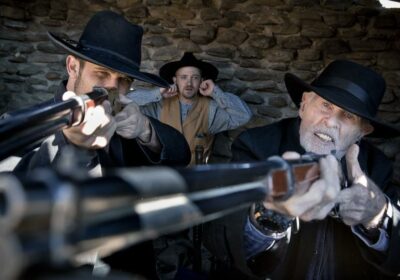‘Last Shoot Out’ Review: Bruce Dern’s Turn as a Mean Galoot Sets Indie Western Apart

There is a distinct flavor of the brawnily austere Westerns that comprise Budd Boetticher’s cult-favorite Ranown Cycle — and more than a hint of another showcase for the great Randolph Scott, Sam Peckinpah’s “Ride the High Country” — in director Michael Feifer’s “Last Shoot Out,” a small-budget indie that aims to please the currently underserved niche audience for oaters.
To be sure, no one will ever confuse this slow-paced concoction with one of the classics that so obviously influence it. But it’s definitely a cut above some of the recent streaming-ready attempts to sustain the genre — indeed, it’s a marked improvement over Feifer’s own “Catch the Bullet,” released just last September — and it features a ferociously nasty turn by Bruce Dern in a role that recalls a character from yet another golden oldie, Walter Brennan’s vicious Old Man Clanton in “My Darling Clementine.”
Dern doesn’t get a lot of screen time here, but he makes every moment count as Blair Callahan, the snarlingly authoritative paterfamilias for a family of rustlers, killers and assorted other ne’er-do-wells whose none-too-bright son Jody (Michael Welch, over the top and clearly enjoying himself) has unaccountably captured the fancy of Jocelyn (Skylar Witte), a small-town beauty whose lawman dad recently died.
But just before the newlyweds can get down to conjugal business on their wedding night at the Callahan ranch, Jocelyn overhears a disturbing conversation between Blair and Sid (Cam Gigandet), the old fellow’s savvier and deadlier son. Both men agree that Jody might not rise to the occasion that evening, and Sid might have to jump into the saddle instead. But wait, there’s more: Blair makes pointed reference to Sid’s killing of Jocelyn’s father, a preemptive move to keep the lawman from arresting Jody for the murder of a “floozie” who besmirched his manhood.
Understandably upset, Jocelyn vamooses from the Callahan enclave, and eventually crosses paths with two travelers bound for a remote stagecoach station: Red (Peter Sherayko), a grizzled fellow who’s transporting a wagon of supplies to the outpost, and Billy (Brock Harris), a taciturn stranger on his way to a date with destiny of some sort. Billy proves quick on the draw when Sid and his confederate Twigs (Jay Pickett) show up to retrieve the runaway bride. More important, however, Billy also demonstrates uncommon self-restraint, preferring to wound and disarm Sid rather than shoot the guy dead.
Of course, Billy comes to regret temporarily placing his killer instinct on hold when Blair arrives at the station with Sid, Jody and a passel of hired guns to shoot first and never bother to ask questions. In the world according to Blair, there’s no such thing as innocent bystanders, not even among stranded stagecoach passengers. “Go kill every goddamn one of them,” the old man commands. “Leave no one alive.” Dern doesn’t even have to rise to his feet to persuasively sell dialogue like that.
Operating from a workmanlike script credited to Lee Martin, Feifer capably sets up the interactions and revelations — a few of them mildly surprising — that lead to the titular clash at the stagecoach station. There are a tad too many flashbacks, which feel like so much padding, and it must be acknowledged that both Harris and Gigandet look less like hardened gunslingers than male models on some improbably far-flung western-wear fashion shoot.
Still, both actors are up to the task of handling rough stuff in the well-staged, viscerally edited (by Ted Gianopulos) action scenes. And they’re backed by a game supporting cast that includes David DeLuise as the resourceful operator of the stagecoach station, and Brock Burnett as a snooty entrepreneur who behaves as though he believes traveling by stagecoach, and actually having to hang out with other passengers, represents the worst sort of slumming imaginable.
The latter character usually is introduced in Westerns of this kind only to serve as the butt of jokes (which he does, repeatedly) and increase the body count. That he actually doesn’t get what’s coming to him is just one sign the filmmakers want to give their audience an ending that is not merely happy, but borderline joyous. Well, joyous except for the characters who deservedly wind up on Boot Hill.
Source: Read Full Article